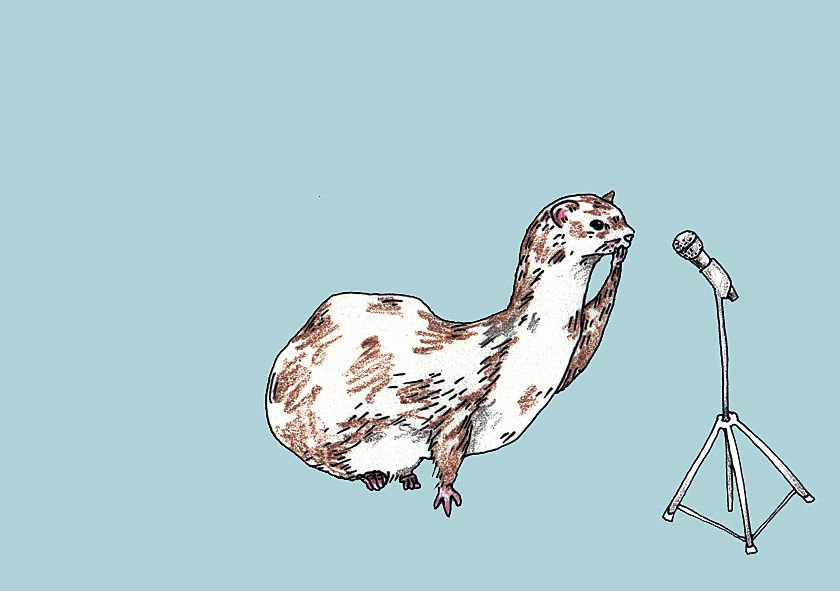Speech, Modesty, and Moonshine
Alice Miller on our cultural reluctance (or is it an inability?) to articulate ourselves
Some years back, I went to what they call grad school in America, where a friend from New York made fun of me for not speaking in complete sentences. I would start – with such confidence! And then I’d question myself… (surely my point was already grasped by the other party; surely they thought it obvious; surely it would be better not to make an unqualified assertion)… and I’d often trail off softly into a deeply profound silence, or I’d let the crucial matter float with a gentle, oh, you know.
My friend suggested it was because my brain moved so quickly that my mouth struggled to keep up. He was, of course, too kind.
While I accepted this as my own special and shameful problem, I later noticed, on my return to New Zealand, that these traits were also part of our national character. Unlike most Americans, we walked in a haze of drifting sentences, requests for affirmation, qualified statements, and vague speech. Our fine politicians frequently demonstrated the great blossoming of prevaricating nonsense. Flight of the Conchords sang deliberately mumbled odes to our ineptness. But at least, we whispered, we weren’t like the Americans. At least we weren’t brash. At least we weren’t trying to sell something.
Our cultural reluctance to not put ourselves forward – our island fields of cowering poppies, our kumara which won’t speak its own sweetness – is a rather quaint protective mechanism. If we don’t utter what we wish to say, then no one can tear us down for saying it wrong. In vagueness, there is safety.
And in clarity, there’s a great deal of work.
Of course, we’re not the only people who are less-than-articulate. The trend is everywhere, in language spoken and written. There’s no shortage of people who currently bemoan the decline of language. Today, our thoughts are stuffed into a status update or a tweet and chucked into the world without another thought. Soon, the rationale goes, we’ll no longer be able to pay attention to anything without checking our email each and every time that the person we’re (kind of) listening to has to breathe.
Orwell decried the state of the English language in 1946, in Politics of the English Language – an essay that, while not without its problems, is still a decent read. Recently, Tony Judt observed that since Orwell’s accusations, our problem has shifted – from deliberate vagueness to ‘shoddy prose’. According to Judt, ‘we speak and write badly because we don’t feel confident in what we think and are reluctant to assert it unambiguously (“It’s only my opinion…”).’ He suggests we’ve moved from Orwell’s ‘newspeak’, to ‘nospeak.’
But perhaps, in the moments we are less-than-articulate, New Zealanders are just being honest. We’re not pretending to be glossy; we’re not putting on a show. We want to understand, not to intimidate. Even the word articulacy has such a delicate, rarefied air, a word that might be pronounced while slightly elevating one’s little finger and pronouncing each syllable like it is a prayer. We are not pretending to be other than ourselves.
At this stage, you’ll excuse me for leaning heavily on someone who knows about eloquence. Cue Montaigne:
I sometimes hear people who apologize for not being able to say what they mean, maintaining that their heads are so full of fine things that they cannot deliver them for want of eloquence. That is moonshine. Do you know what I think? It is a matter of shadowy notions coming to them from some unformed concepts which they are unable to untangle and to clarify in their minds: consequently they cannot deliver them externally. They themselves do not yet know what they mean. Just watch them giving a little stammer as they are about to deliver their brain-child: you can tell that they have labouring-pains not at childbirth but during conception!
Our difficulty in articulating ourselves may come from our insecurity – but that doesn’t excuse it, or make it profound.*
Language is the art of persuasion. If we don’t understand the way it works, we can’t unravel the mythologies that the media, the politicians, the artists weave around us. But how the hell do we improve? In the States, they teach ‘rhetoric’ as a basic class in college. They teach the art of the argument, one of our oldest and greatest skills, as discussed by Aristotle and critiqued by Plato – a key tenet of expression, advertising, and politics.
On the other hand, the funny thing I remember about these rhetoric classes is that it was generally accepted they could be taught by anyone. You didn’t have to know anything; all you had to do was turn up to class five times a week and teach the intricacies of the ‘rhetorical act’. A guy I knew had enough of a drinking problem to turn up every morning reeking of booze and still drunk. I imagine it’s difficult to teach anyone to be articulate – but I’m sure it’s particularly taxing while you’re sozzled. I use this example to show one of many reasons why I don’t propose that we emulate an American model.
But the teaching of rhetoric, rather than the drunk teachers, doesn’t seem like a terrible idea for New Zealand. Certainly, further emphasis on public speaking would assist students to assert their ideas with clarity. I also suggest that we zoom in on the level of the sentence; let’s become more attentive to the micro-level. John D’Agata once described Joan Didion’s syntax as ‘a steel trap’. He said that you couldn’t come out of one of her sentences without believing exactly what she wanted you to believe.
Why did we ever cut parts of speech from the curriculum – verbs, nouns, past participles? As an overwhelmingly monoglot culture, students often don’t stumble across these concepts on their own. Say you’re building a house. Would you build it without knowing about the potential types of wood, about the best outlook, about where the sun rose and the prevailing wind blew? Would you slap in any kind of nail, and shove in any kind of glass you found lying about in the garage?
With a house, as with a sentence, we need to understand our materials to ensure our structure is solid, tight, stylish. William Carlos Williams called a poem ‘a small (or large) machine made of words.’ The same goes for a sentence. Why don’t we get each cog in our machine working? Why don’t we learn what our machine is, and what it sets out to do?*
It occurs to me as I write this that I’m probably talking about Pakeha culture – because there’s a far firmer tradition of verbal expression in Maori. I also want to stress that I’m not arguing for a grammatical police force. Grammar, like any area of human life, is stuffed with people who decide there are absolute rules – and that the purpose of those rules is to point at the people who do not obey them. Yes, the Oxford comma makes more sense to me than the alternative, but why bother pointing at those who don’t use it?
I’m also not calling for emptiness, not calling for us to use words that aren’t understood by anyone else. Nor do I propose we only use words understood by everyone (I had a teacher once who would only use words that could be understood by her father who had dropped out of high school – but the funny thing was, she was writing poems, which many very well-educated people still couldn’t grasp). I’m calling for an advance on the conversations we’re already having, and for a rigor that I think we currently lack.
And this doesn’t mean criticising those who are inarticulate (except maybe those who run our country, who we should hold to higher account). I just want us to think more about what we are trying to say and the way we want to say it. There is much more bravery and honesty involved in working hard to build that house as best as you bloody well can, and saying, Here it is. Here’s what I learned. Help me to make the next one better. We are terrific, talented, and unique people. But we need to push ourselves harder to find ways to admit it, and in doing so, to demonstrate it.*
There will always be imprecision. There will always be people who prefer to say something pretentious and empty than utter anything truthful for which they’ll be judged. If everyone was agonising over their sentences, nothing would get done.
I’ve heard people here criticise Americans for their verbal fluency, which is seen as an act, a show, a manipulation. However, I’d say our own stumbling, our own trailing off – even though it is generally automatic – is merely a different kind of act. It asks for attention, forgiveness; it draws attention to the speaker, not to what is being said. ‘Once you have mastered the things,’ Horace says, ‘the words will come freely.’
Overall, this is a far more complex issue than I make out. I think there is a place for vulnerability in speaking and writing. But our umming and ahhing, our trailing off, our inability to voice what actually goes on in our brains, feels less about representing our vulnerable place in the world, and more about our insecurity to put ourselves forward. Our supposed modesty can conceal our laziness, our complacency. Let’s be brave. Let’s try to give our thoughts the time and care that they deserve.


